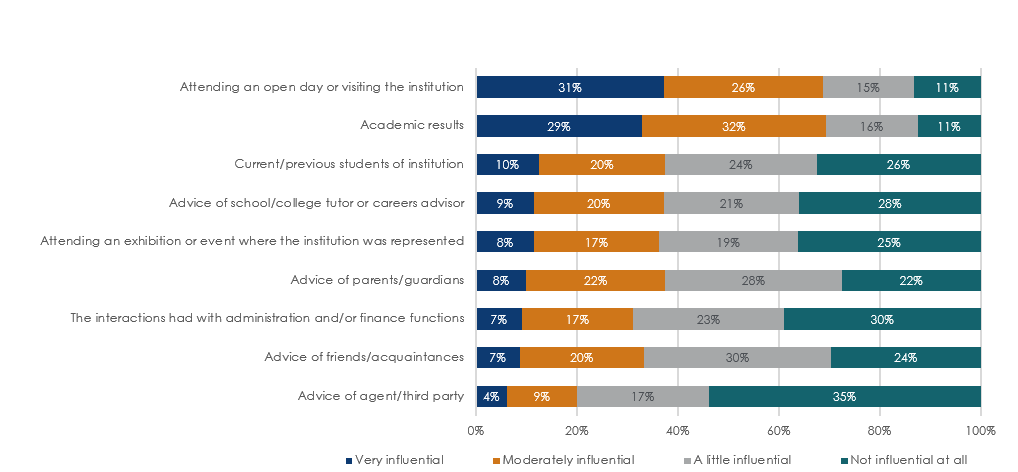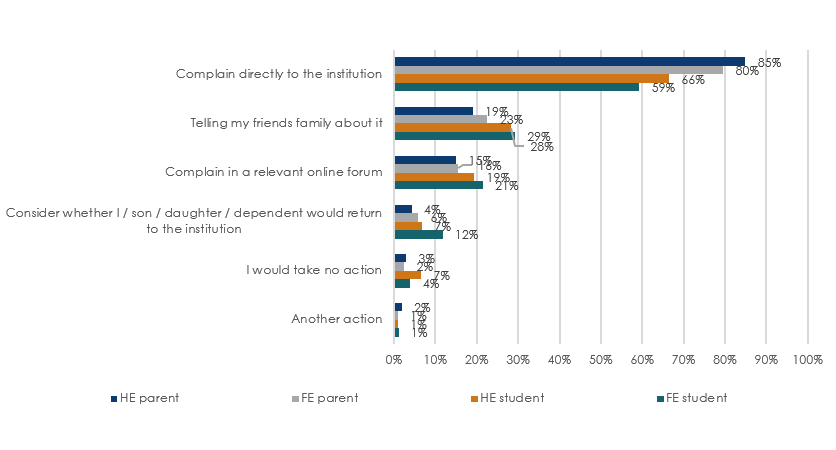Open days, academic results, payments: What influences college choice?

If you were asked to name the main reason behind students’ and parents’ choice of further education institution, what would you give as the answer? You may think that having plenty of course options is important, or that the number of people they already know at the college plays a part. However, research recently conducted by YouGov, commissioned by WPM Education, found a potentially more surprising answer; that in fact, the most influential factor when selecting an FE or HE institution is the open day.
We were initially surprised by the result, but it does make perfect sense. Open days enable students to see beyond a college’s website or other marketing material. They can meet existing students and teachers to hear first-hand what studying at the institution is like, and explore the different course options available to them, bringing together many factors that impact upon student experience and choice. Therefore it’s no surprise that 31 per cent of students and parents admitted open days weigh heavily on their decisions, ranking them as ‘very influential’. This is closely followed by academic results, rated very influential by 29 per cent of respondents – a less surprising result for many.

“Which factors influence students’ choice of institution?” © WPM Education
The research also highlights the customer experience preferences of FE students and their parents. For parents, the greatest influence on experience is the quality of communication received from the institution during the application and before course commencement, with 82 per cent listing this as either important or very important.
Communication during the application process is also important for students, with 69 per cent citing it as an important factor in their decision. However, for these students, access to academic support (69 per cent) and ease of access to information online (69 per cent) are equally important.
Students and their parents have similar expectations from FE institutions when it comes to a great customer experience (although students want this to take place online). With this information in mind, colleges must endeavour to make the necessary improvements in these areas, thereby ensuring the customer experience, from both a student and a parent perspective, is consistently a good one.
These figures are also significant when it comes to examining the factors which influence parents and FE students to recommend an institution. Again, parents are most likely to share a positive experience regarding quality of communications during application (49 per cent) and before course commencement (50 per cent). They are also more likely to recommend an institution that provides quality information upon arrival (48 per cent), as well as easy access to information on campus (39 per cent) and online (45 per cent).
FE students expect a similarly high level of communications competency from an institution. Our research shows that this has a great effect on the likelihood of students to recommend their institution to friends or family. Effective communication is most crucial for students when they first arrive at the college (37 per cent), but a similar number consider access to support on academic issues to be equally important when deciding or not whether to make a recommendation (37 per cent).
When it comes to payments, a bad experience will lead most FE parents (80 per cent) and FE students (59 per cent) to complain directly to the institution about the problem. Even more significantly, over a quarter of FE students (28 per cent) would also complain to their friends and family about the experience and a quarter said they would be much less likely to recommend an institution after a problem with payments.
What does this mean? In a time where student recruitment and retention is hyper competitive – and therefore a bigger priority than ever – colleges must consider that every element of a student’s experience, from the open day to the payment experience and everything in between, has the potential to affect their reputation. Students talk to their friends and share their experiences openly when they encounter issues. Consequently, improving every element of the student experience should be a priority for colleges as they look to safeguard against reputational damage and increase their intake of students.

“In the event of a poor payment experience, who would you complain to?” ©WPM
Many might have assumed that academic results alone are the biggest factor in influencing a student’s choice of institution. However, our research shows that this is just one part of the complex decision making process students and parents go through when choosing which college to attend. Colleges need to look at the whole student experience during recruitment, from access to important information to the effectiveness of their payments processes: only an effective and integrated approach to student communications and access will enable colleges to truly maximise student recruitment opportunities, safeguard reputation and deliver the quality customer experience that both students and parents expect.
Holger Bollmann is director at HE/FE payments specialist WPM Education












Responses